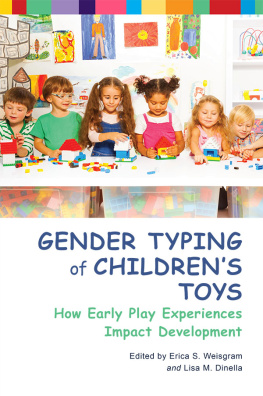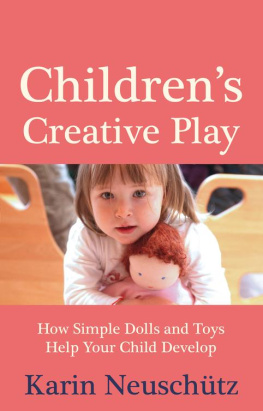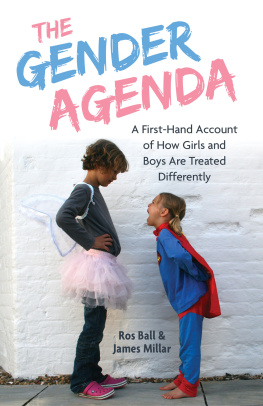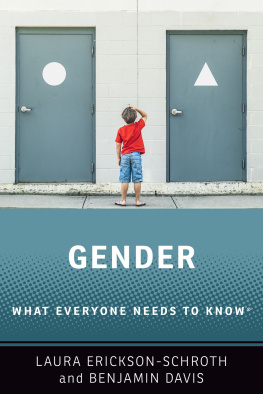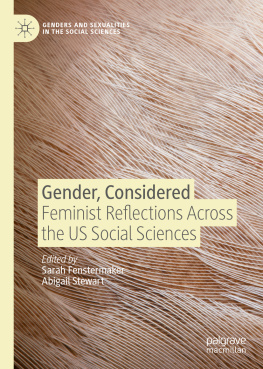Copyright 2018 by the American Psychological Association. All rights reserved. Except as permitted under the United States Copyright Act of 1976, no part of this publication may be reproduced or distributed in any form or by any means, including, but not limited to, the process of scanning and digitization, or stored in a database or retrieval system, without the prior written permission of the publisher.
Electronic edition published 2018.
ISBN: 978-1-4338-2885-0 (electronic edition).
The opinions and statements published are the responsibility of the authors, and such opinions and statements do not necessarily represent the policies of the American Psychological Association.
Names: Weisgram, Erica S., editor. | Dinella, Lisa M., editor.
Title: Gender typing of childrens toys : how early play experiences impact development / edited by Erica S. Weisgram and Lisa M. Dinella.
Description: First Edition. | Washington, DC : American Psychological Association, [2018] | Includes bibliographical references.
Subjects: LCSH: Child development. | Child psychology. | ToysPsychological aspects. | PlayPsychological aspects.
A CIP record is available from the British Library.
To Alex and Benjamin, who show me the joy of play each and every day.
To William and Elizabeth Beldowicz. They inspire me to work hard, play hard, and use science to make the world a better place. I hope they always remember that there are no such things as girls toys and boys toys, just toys and kids.
CONTRIBUTORS
Rebecca S. Bigler, PhD, Professor of Psychology and Womens and Gender Studies, The University of Texas at Austin
Giulia A. Borriello, MS, Doctoral Student, The Pennsylvania State University, University Park
Christia Spears Brown, PhD, Professor of Psychology, University of Kentucky, Lexington, and Director of Social Inequality in Development Research Group
Isabelle D. Cherney, PhD, Dean of the School of Education and Social Policy, Merrimack College, North Andover, MA
Rachel E. Cook, MS, Doctoral Student in Family and Human Development, Arizona State University, Tempe
Emily F. Coyle, PhD, Assistant Professor of Psychology, St. Martins University, Lacey, WA
Jacqueline Davis, MPhil, Doctoral Student, University of Cambridge, Cambridge, England
Lisa M. Dinella, PhD, Principal Investigator, Gender Development Laboratory; Associate Professor of Psychology; and Affiliated Faculty Member of Gender Studies; Monmouth University, West Long Branch, NJ
Lise Eliot, PhD, Professor of Neuroscience, Chicago Medical School of Rosalind Franklin University of Medicine and Science, Chicago, IL
Megan Fulcher, PhD, Associate Professor of Psychology, Washington and Lee University, and Director, Washington and Lee Gender Psychology Lab, Lexington, VA
Melissa Hines, PhD, Professor of Psychology and Director, Gender Development Research Centre, University of Cambridge, Cambridge, England
Campbell Leaper, PhD, Professor of Psychology, University of California, Santa Cruz
Lynn S. Liben, PhD, McCourtney Professor of Child Studies; Professor of Psychology; Professor of Education; Professor of Human Development & Family Studies; and Director of the Cognitive and Social Development Lab, The Pennsylvania State University, University Park
Carol Lynn Martin, PhD, Cowden Distinguished Professor, T. Denny Sanford School of Social and Family Dynamics; and Executive Director, Link Enterprise: Bringing People Together in a Diverse World, Arizona State University, Tempe
Sarah K. Murnen, PhD, Samuel B. Cummings Professor of Psychology, Kenyon College, Gambier, OH
Diane N. Ruble, PhD, Emeritus Professor of Psychology, New York University, New York
Kingsley M. Schroeder, MS, Doctoral Student, The Pennsylvania State University, University Park
Ellen A. Stone, PhD, Doctoral Student, Department of Psychology, University of Kentucky, Lexington
Erica S. Weisgram, PhD, Professor of Psychology, University of WisconsinStevens Point
Kristina M. Zosuls, PhD, Visiting Faculty/Scholar/Researcher, T. Denny Sanford School of Social and Family Dynamics, Arizona State University, Tempe

INTRODUCTION
ERICA S. WEISGRAM AND LISA M. DINELLA
Do boys and girls play with different toys? Is there such a thing as a girl toy or a boy toy? If boys and girls are interested in and play with different toys, why do these differences occur? Are there biological factors that contribute to gender differences in childrens toy interests and play? Cognitive factors? Social factors? Is it problematic for boys and girls to play with different toys? What do top scientists say about childrens gender-typed toy play? What recommendations do these experts make for parents, educators, and toy developers? As a part of a societal conversation about gender and toys, these questions, among others, have received considerable attention in the last 5 years within the psychological literature, social media, and popular press and have also been considered by parents, scholars, feminist activists, and even the White House. These questions often lead to debate among interested parties and do not have clear-cut answers, as the chapters in this volume illustrate. The scientific literature demonstrates that gender differences in childrens toy interests and play are complex in their presence and causes, as well as their consequences for child development.

